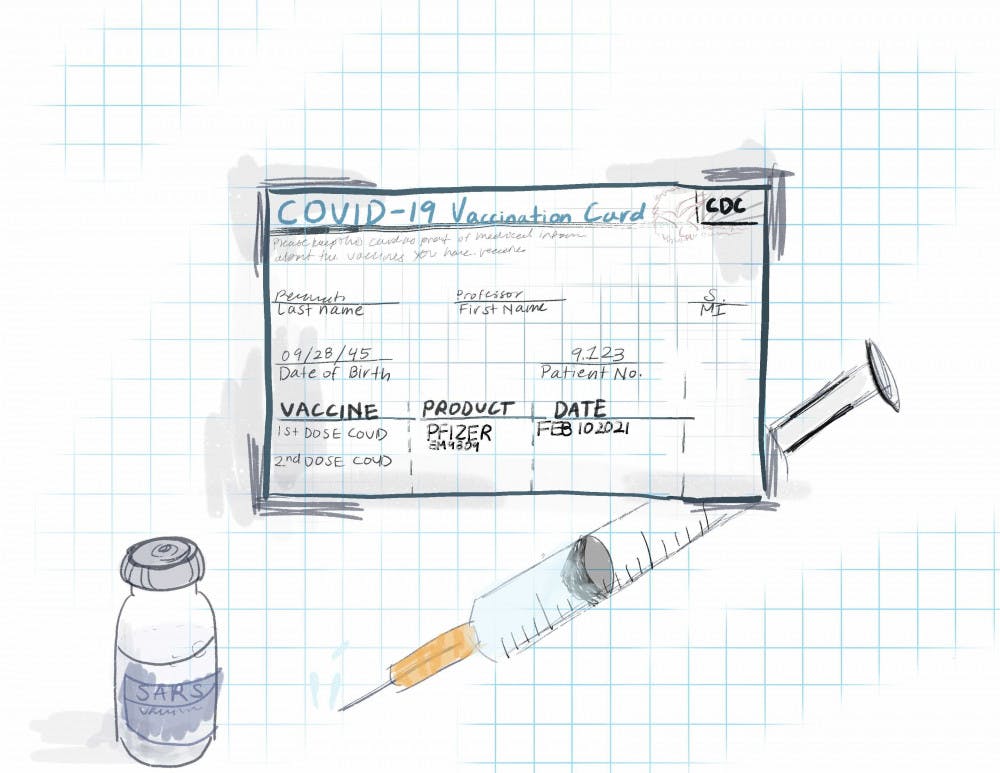For Barrett Hazeltine, professor emeritus of engineering, setting an appointment for his first dose of the COVID-19 vaccine was a complicated process. Hazeltine, 89, said that, like anything else in Rhode Island, “you gotta know a guy.”
A friend told him that since residents 75 and older were eligible for the vaccine, he could call Providence City Hall to make an appointment. Hazeltine reserved a time and got his first dose of the vaccine in early February.
The vaccination process went smoothly, Hazeltine said, but “if someone hadn’t called (my wife and me) up and alerted us to the possibility, we’d probably still be on a waitlist somewhere.”
The Herald spoke to four professors over 75 years who had received their first dose of the vaccine for COVID-19. Each found the sign-up process to be difficult, but were relieved to have another level of protection from the coronavirus. They are all scheduled to receive their second dose within the next few weeks.
Professor of Comparative Literature Arnold Weinstein was able to sign up for his shot because a friend had forwarded a link to a sign-up portal. “(My wife and I) weren’t even sure if this was for real at first,” he said. Weinstein and his wife were only convinced when they saw that the sign-up link was through the Rhode Island Department of Health website.
Weinstein, 80, had his appointment the next day, and he said he had been lucky to find the opportunity.
As of Feb. 16, Rhode Island had one of the lowest vaccination rates in the country, with 9.5 percent of the state population having received their first shots and 4.4 percent being fully vaccinated. In comparison, Massachusetts has given 13 percent of its population their first shots.
“This notion that there is no central place where you can register and get notified when there is an opening near you for which you qualify is criminal negligence,” Andy van Dam, professor of computer science, said.
Van Dam, 82, created accounts on the vaccine registration portals for CVS, Walgreens and the Barrington Senior Center. “For almost a week, I stayed up until well past midnight (and) just repeatedly banged on the website to see if any appointments would open up,” he said. Each day, he would wake up at 7 a.m. and start refreshing the websites again.
“By being persistent to a fault, I found that one early morning five spots opened up (at) Walgreens,” van Dam said.
Richard Arenberg, visiting professor of the practice of political science and interim director of the Taubman Center for American Politics and Policy, lives in Massachusetts and also encountered difficulty scheduling his first dose.
“The sites that were available within a reasonable distance just didn’t have any appointments left,” said Arenberg, who is 75. He eventually got an appointment through his physician’s office and received his first shot Feb. 10. He said it was painless and efficient.
Weinstein explained that getting his first shot brought “an enormous sense of relief,” but he still has concerns about efficacy with variants of the virus. “We’re less and less sure just exactly how extendable and reliable (the vaccine is) going to be if the pandemic does change form,” he said.
Van Dam shared similar concerns about how the virus could mutate. “My wife and I will get our second shots on Mar. 13 and not change our lives as a result in any noticeable way,” he said. “We can’t until there is this mythical herd immunity.”
Even with the potential appearance of variant forms of the virus, Arenberg said he hopes that being vaccinated will bring him closer to normal socializing and seeing his grandkids. “I have a four-year-old grandson who is out in Oregon. We haven’t seen him now for what’s approaching half his life,” he said.
Arenberg said he is also excited to resume teaching in person. “I’m not sure at exactly what point it will feel safe enough, but I am anxious to do it,” he said.
Weinstein is looking forward to teaching in the classroom again. He has found that instruction over Zoom does not compromise the content of his courses, but he said it is difficult to create the same relationships with students and colleagues. “The intellectual mission of the University is not really paralyzed by” the pandemic, Weinstein said. “The social mission of the University is.”Weinstein also said remote learning has not been equal in quality for all students across the country.
“It’s such a question of privilege. The privileged can make the online arrangements and Zoom work,” he said. “It’s been a diagnostic moment for American society about the people who are the most exposed and the least served.”
Van Dam also emphasized how inequity has revealed itself throughout the pandemic. “All the good parts of being electronically connected are denied to a segment of the population that probably needs it most,” he said.
”We’ve lost so many people who stopped either working or going to school,” van Dam said. “Some of those people will never catch up, and that presents enormous societal problems.”
He said that getting the vaccine was “kind of bittersweet” because it was emblematic of this “digital divide.” He explained that those without access to a computer or help navigating several different portals would have a harder time getting vaccinated.
“This again emphasized for me that we don’t just have a digital divide in this country,” van Dam said. “We have a digital chasm.”

Katy Pickens was the managing editor of newsroom and vice president of The Brown Daily Herald's 133rd Editorial Board. She previously served as a Metro section editor covering College Hill, Fox Point and the Jewelry District, housing & campus footprint and activism, all while maintaining a passion for knitting tiny hats.





